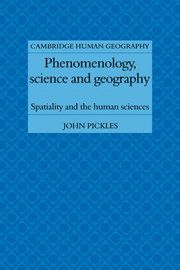Book contents
- Frontmatter
- Contents
- Preface
- Acknowledgements
- 1 Introduction
- PART I GEOGRAPHY AND TRADITIONAL META-PHYSICS
- PART II GEOGRAPHY AND PHENOMENOLOGY
- PART III PHENOMENOLOGY AND THE QUESTION OF HUMAN SCIENCE
- 5 Husserlian phenomenology: the foundational project
- 6 Phenomenology, science and phenomenological geography
- 7 Towards a fundamental ontology of science
- PART IV HUMAN SCIENCE, WORLDHOOD AND SPATIALITY
- Notes
- References
- Index
7 - Towards a fundamental ontology of science
Published online by Cambridge University Press: 07 September 2010
- Frontmatter
- Contents
- Preface
- Acknowledgements
- 1 Introduction
- PART I GEOGRAPHY AND TRADITIONAL META-PHYSICS
- PART II GEOGRAPHY AND PHENOMENOLOGY
- PART III PHENOMENOLOGY AND THE QUESTION OF HUMAN SCIENCE
- 5 Husserlian phenomenology: the foundational project
- 6 Phenomenology, science and phenomenological geography
- 7 Towards a fundamental ontology of science
- PART IV HUMAN SCIENCE, WORLDHOOD AND SPATIALITY
- Notes
- References
- Index
Summary
The transformation of science is accomplished always only through itself. But science itself thereby has a two-fold foundation: (1) work experiences, i.e., the direction and the mode of mastering and using what is; (2) metaphysics, i.e., the projection of the fundamental knowledge of being, out of which what is knowledgeably develops. Work experiences and the projection of being are reciprocally related to one another and always meet in a basic feature of attitude and of humanly being there (Dasein).
(Heidegger, 1967, 65–6)Phenomenology and a fundamental ontology of science
The phenomenological aim of returning ‘to the things themselves’ permits Husserl and Husserlian phenomenology to seek a foundational ontology for the empirical sciences and the creation of new a priori formal sciences in the formal and material regional ontologies, in a lifeworld ontology, and ultimately in transcendental phenomenology. Grounding the sciences in this way was a task for phenomenology as rigorous philosophy and method, alone capable of clarifying the basic concepts of the sciences. Thus, geographers can clarify their empirical investigations through their own regional ontologies, to secure the foundations of a geographical perspective in the phenomena themselves, and in dealing with the human realm this requires an interpretative component to ensure that their concepts are relevant and meaningful, and not mere constructions.
- Type
- Chapter
- Information
- Phenomenology, Science and GeographySpatiality and the Human Sciences, pp. 121 - 138Publisher: Cambridge University PressPrint publication year: 1985



